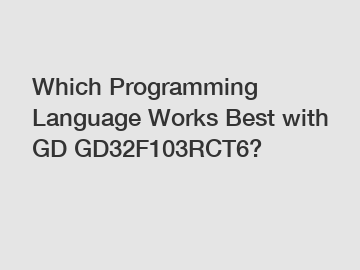Which Programming Language Works Best with GD GD32F103RCT6?
Which Programming Language Works Best with GD GD32F103RCT6?
When it comes to programming the GD GD32F103RCT6 microcontroller, developers often find themselves at a crossroads trying to determine the most suitable programming language. With numerous options available, such as C, C++, Python, and even assembly language, it can be challenging to choose the right one. In this article, we will explore the compatibility and effectiveness of various programming languages with the GD GD32F103RCT6 microcontroller and answer the burning question: Which programming language works best with GD GD32F103RCT6?
1. C Programming Language:

The C programming language is widely regarded as the go-to choice for microcontroller programming. It offers excellent control over the hardware and provides low-level access to memory, making it suitable for embedded systems like the GD GD32F103RCT6. C's simplicity and efficiency enable developers to maximize the performance of the microcontroller. Additionally, there are numerous libraries and resources available for C, making it easier to develop and troubleshoot code.
2. C++ Programming Language:
C++ is an extension of the C programming language and is known for its object-oriented programming capabilities. With C++, developers can take advantage of features such as classes and templates, making code organization and reusability easier. However, compared to C, C++ introduces additional overhead, which can impact performance on resource-constrained devices like the GD GD32F103RCT6. Therefore, while C++ can be used effectively, careful consideration of memory usage and optimization is crucial.
3. Python Programming Language:
Python is a high-level programming language known for its simplicity and readability. While Python may not be the first choice for microcontroller programming due to its interpreted nature and relatively slower execution speed, developments in the field have made it possible to use Python with microcontrollers. For the GD GD32F103RCT6, Micropython, a lean version of Python, offers a viable option. Micropython provides a subset of the Python language, allowing developers to write high-level code and interact with hardware peripherals.
4. Assembly Language:
Assembly language is the lowest level of programming and provides direct access to the microcontroller's instructions. Writing code in assembly allows for precise control over performance and resource usage but comes at the cost of increased complexity and reduced code maintainability. Developers who require utmost control over the GD GD32F103RCT6's hardware and are willing to invest time and effort into understanding microcontroller internals may opt for assembly language programming.
In conclusion, the programming language that works best with the GD GD32F103RCT6 microcontroller ultimately depends on the specific requirements of the project. However, based on the points discussed above, using the C programming language is the most suitable choice for most developers. Its low-level access, efficiency, and extensive resources make it a robust option for programming the GD GD32F103RCT6. C++ can also be used effectively, but careful consideration must be given to memory usage and optimization. Python, particularly Micropython, offers a high-level option for developers who prioritize ease of use and code readability. Finally, assembly language provides unparalleled control over the microcontroller, but at the expense of increased complexity and reduced code maintainability.
Whether you choose C, C++, Python, or assembly language, it's important to note that mastering the chosen programming language and understanding the GD GD32F103RCT6's hardware specifications are key to efficient and successful development. By selecting the appropriate programming language and leveraging its strengths, developers can unlock the full potential of the GD GD32F103RCT6 microcontroller and bring their projects to life.
Want more information on Smd Package Types, high-quality SOP packaging, MSP430F5171IRSBT? Feel free to contact us.
239
0
0

Comments
All Comments (0)